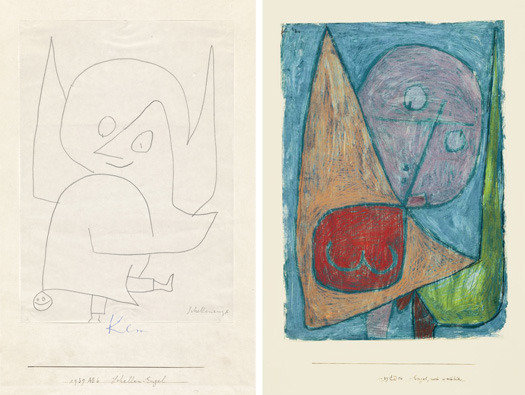Three exhibitions
dal 1/2/2013 al 13/4/2013
Segnalato da
1/2/2013
Three exhibitions
Museum Folkwang, Essen
'Paul Klee's Angels' is the first exhibition to focus on this unusual group within Klee's highly diverse oeuvre, and with around 80 drawings, watercolors, gouaches and paintings presents the majority of his works on this subject. With 'Dressing - Dressing Up', the Photographic Collection focuses on representations of people and the clothes they wear. 'Berlin Life' presents 70 works from the collection of Volker Noth posters and several examples of his book design.

Paul Klee's Angels
Paul Klee’s angels number amongst the artist’s most popular works. They not only appeal to art lovers but have also gained huge popularity as poetic guardians. As winged hybrids, half man, half celestial messenger, they represent a transitional form between earthly and heavenly existence, which serves our need for spirituality. Yet at the same time angels reflect the modern skepticism towards religion and questions of faith. In addition, they offer art historians, authors, philosophers, theologians as well as psychologists intellectual starting points.
Klee produced most of his angels in the final years of his life, between 1938 and 1940. As such, the drawings, watercolors and paintings are also an expression of his situation at the time, characterized as it was by serious illness and open animosity from the Nazis. They give an impression of how Klee felt, at the transition between life and death. They show fear and threat, but also intellectual detachment, wit and humor. Klee’s angels are still largely rooted in human existence, and this is the deeper reason for their popularity. They have minor weaknesses and flaws, are forgetful or ugly, full or worries or playful, meaning that everyone can recognize him- or herself in them. Stylistically, these are characteristic examples of the minimalist drawing style found in Paul Klee’s late work.
This is the first exhibition to focus on this unusual group within Paul Klee’s highly diverse oeuvre, and with around 80 drawings, watercolors, gouaches and paintings presents the majority of his surviving works on this subject.
In collaboration with the Paul Klee Center, Bern
Made possible through the kind support of Sparkasse Essen
---------
Dressing – Dressing Up
With the exhibition Dressing – Dressing Up, the Photographic Collection focuses on representations of people and the clothes they wear. How do dressing and dressing up influence the image we have of ourselves and others? Selected portraits and documentary photographs from the inventory of the Photographic Collection explore the roles and functions of these activities, which only appear to differ at first glance.
Clothing makes reference to the social and cultural identity of its wearer or to the image the wearer wishes to project. Dressing up, in contrast, breaks with social convention, is frequently ritually anchored in traditional events over the course of the year and is thus accepted. Photographers always try to identify the ideas their models associate with clothing, highlight its social significance and on more than the odd occasion discover the disguise behind the clothing and the desire to be different.
With 50 works by 20 artists, the exhibition spans almost a century. It is structured into four chapters, in which the boundaries between dressing and dressing up are blurred. Lotte Errell and Germaine Krull approach the topic between the cultural extremes of complete concealment and nudity. Käthe Buchler and August Sander present people from various social backgrounds during and after the First World War in new garb. Timm Rautert, André Gelpke and Elfi Fröhlich explore the uniform as an expression of a profession or attitude towards life. Contemporary positions such as Jürgen Teller, Tobias Zielony, Albrecht Tübke, Rineke Dijkstra and Oliver Sieber examine the significance of clothing in a global youth culture, while Andreas Horlitz, Axel Hoedt, Chargesheimer, Homer Sykes and Jürgen Heinemann focus on regional customs.
What is common to the photographers represented here is a virtually “ethnographic” eye, which is able to discover new things in both local and foreign cultures.
The exhibition was curated by Inga Schneider, who is a graduate of the advanced study programme in Art Criticism & Curating at Ruhr University Bochum.
----------
Berlin Life
Posters by Volker Noth
“I think in pictures […] and I notice very quickly whether the image in my head will also work on paper.” Volker Noth (2007)
For many years posters by Noth (born in 1941) have enriched and shaped the cultural landscape in Berlin. Particular mention should be made to his work with the International Film Festival, the Berlinale (a collaboration that would span decades) and the resulting body of posters. He was also commissioned to create advertisements for theatres, museums and other leading Berlin institutions such as the Film Museum Berlin, Berlin Zoo, the German Historical Museum, numerous departments of the State Museums of Prussian Cultural Heritage and Berlin’s Schiller Theater.
His works demonstrate his excellent feel for making an impact. Photography and typography constitute the key elements and are often combined with rich colours to produce surfaces rich in contrast. His works are seldom “loud” and garish but rather bold and colourful, they try to persuade rather than overpower. His personal style reveals the respectful approach he adopts when interpreting a particular topic.
The German Poster Museum in Museum Folkwang now owns the whole collection of Volker Noth posters. We have chosen some 70 from more than 400 posters to present a representative cross-section of his oeuvre. Some of the motifs reveal the path of development from the sketch to the finished poster. The exhibition is complemented by several examples of Volker Noth’s book design.
The show will be accompanied by a catalogue published by Edition Folkwang / Steidl.
Image: Paul Klee Engel, noch weiblich, 1939 Zentrum Paul Klee, Bern
Press Office
Anna Littmann, T +49 201 8845 160, presse@museum-folkwang.essen.de
Museum Folkwang
Museumsplatz 1 45128 Essen, Germany
Hours: Tuesday–Sunday 10am–6pm
Friday 10am–10:30pm
Admission
Standard: € 8
Concession: € 5



